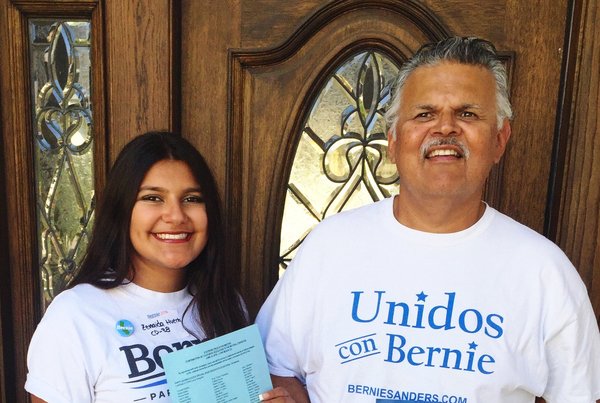Zenaida Huerta fondly recalls accompanying her father to labor rights demonstrations as a child in California, crediting the experiences for molding her progressive ideals.
But the 17-year-old's own activism is bringing the pair to Philadelphia.
She will be among a handful of teenage delegates attending the Democratic National Convention next week. Her father, Henry, will be at her side, serving as a first-time delegate at age 62. Both will cast their vote for Bernie Sanders, despite Hillary Clinton's status as the presumptive Democratic presidential nominee.
"We're proof that this movement is multi-generational," said Zenaida, who turns 18 next month. "My father, at my age, started off campaigning for a progressive presidential candidate. Here I am today doing the same thing.
- Related stories
- Sanders to meet with delegates before start of DNC
- Hating on Hillary: Republican convention down and dirty
- Airport workers rally ahead of DNC strike planned for next week
- The PhillyVoice guide to the 2016 Democratic National Convention
"It's proof that his movement is going to continue on. We're excited. We've energized young people. Their lives and political ideologies will never be the same."
Inspired by Sanders' positions on trade and wages, Zenaida organized a pro-Sanders club at her high school in Whittier, California, a city in a Los Angeles suburb. She also volunteered for the Sanders campaign, making phone calls and canvassing California's 38th Congressional District.
At the encouragement of Zenaida, Henry eventually became involved in the campaign, too. With two children in college, Henry was attracted to Sanders' education proposals, which call for free tuition at state schools and universities, and his fight against income inequality.
Together, Zenaida and Henry applied to be delegates at the DNC, winning their roles during California's Democratic caucus on May 1.
In Philadelphia, they intend to uphold the wishes of the Sanders supporters who selected them. Henry said he will fight to better align the party's platform with Sanders' agenda, seeking to add language explicitly opposing the Trans-Pacific Partnership.
"I believe I have an obligation to support Bernie Sanders for the nomination and to support his platforms," Henry said. "That's my primary responsibility."
"I think we're going to be a strong voice at the convention," he added. "Want to be respected and we want to be heard. We plan to be heard."
Though Clinton is virtually assured of winning the party's nomination, the Huertas view the Sanders campaign as an opportunity to build a greater movement toward implementing his progressive ideals.
Henry views himself as a potential mentor to the young adults inspired by Sanders. After volunteering for George McGovern's campaign in 1972, Henry continued to advocate for labor rights. He understands the need for persistence in fighting for labor rights, immigration reform and racial justice.
"All those issues are important to our young people," Henry said. "I've been trying to get them to stay engaged, to network and to use this as a way to learn as much as possible and implement Bernie's revolution on a local level."
That means finding – and supporting – progressive candidates for local offices and state seats throughout the United States, Henry said.
Zenaida will study government at Claremont McKenna College in the fall. She does not know exactly where politics might take her, but said she has enjoyed organizing people at the local level.
"What this campaign has been about is addressing a lot of the sufferings in our local communities," Zenaida said. "I'd like to continue to work in that direction. Bernie has (stressed) that his supporters run for office and continue this movement.
"I think it's very important to the movement and to the survival of the Democratic Party to make sure that we don't have a class of political elite."
Several years ago, Zenaida asked her late grandfather, Juan Huerta, why he became an organizer for the United Farm Workers, advocating alongside Cesar Chavez in the Salinas Valley.
"He told me it was a lot of work, but it was right," Zenaida said.
That's her mantra as she follows in the activist footsteps of both her father and grandfather.
"Just as we look at the Civil Rights movement as children, I think our children in the future are going to look aback at the movement that's happening right now," Zenaida said. "They're going to ask us, 'What did you do in the movement?' I know that with the convention and, in the past year, I'm happy to say that I was on the right side of history."

